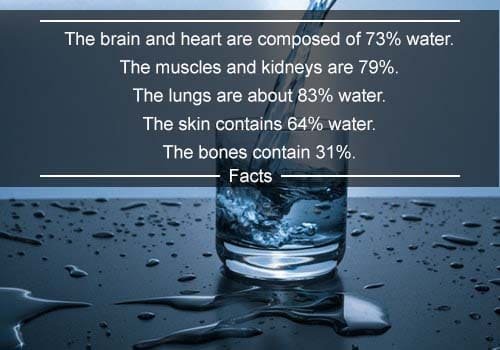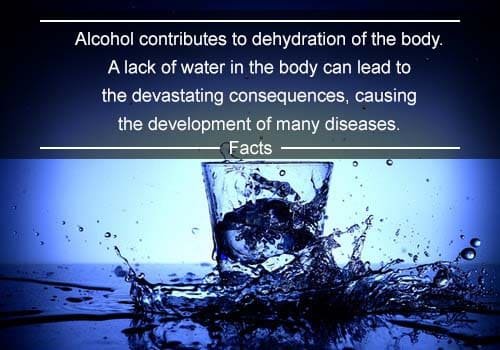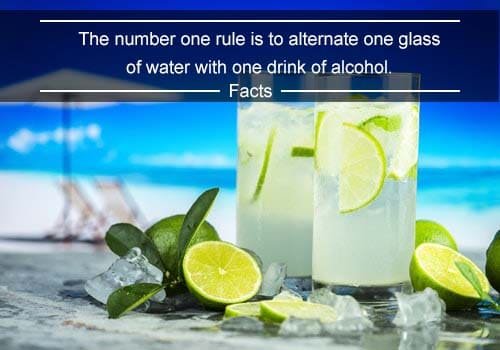Alcohol through the eyes of teenagers is a milestone of adulthood. All parties start out equally fun and carefree. In the midst of this fun, various incidents can occur, such as poisoning, fights, rape, and even death. After drinking too much alcohol, you may spend the rest of the evening in the toilet, and possibly in intensive care. How many times must this occur before you realise what harm you are causing to yourself and your body?
Drink a lot of water! |

The brain and heart are composed of 73% water. The lungs are about 83% water. The skin contains 64% water. The muscles and kidneys are 79%. The bones contain 31%.

Alcohol contributes to dehydration of the body. A lack of water in the body can lead to devastating consequences, causing the development of many diseases.

Dehydration causes headache, dry mouth, fatigue and dizziness.

The number one rule is to alternate one glass of water with one drink of alcohol.
Don't drink a lot of alcohol! |
Fact N1: Alcohol suppresses brain cells. This is connected with alcoholic intoxication.
When you become intoxicated, the following are damaged:
-
The occipital part of the brain (controlling the vestibular apparatus), you may lose your coordination.
-
The work of the "moral" centre is disrupted, cells controlling human behaviour are dying, the sense of shame is dulled, the person becomes cheekier "liberated".
- Damage to cells responsible for memory processes, memory is broken, you lose your memory, a person the next day cannot remember what he was doing, or where he was.
Fact N2: Drinking alcohol affects your hormones.
There are various changes in behaviour and psyche you may experience:
-
A decrease in emotional stability and sharp mood swings, from enthusiasm to apathy.
-
An increase in aggressiveness, a decrease in concentration.
- A harmful effect on the thyroid gland.
Fact N3: A large amount of alcohol disrupts the digestive system.
Various organs may cease working:
-
Alcohol causes structural changes in liver cells, which are responsible for neutralizing toxins in the body.
-
Alcohol interferes with the secretion and composition of gastric juices, thereby leading to a violation of the digestive capacity of the stomach.
- The pancreas does not have enzymes that break down alcohol, so even a small amount of alcohol has a powerful toxic effect on this organ.
Fact N4: Alcohol has a very serious and sometimes irreparable effect on the cardiovascular system.
Toxic effect of alcohol on the heart muscle occurs as follows:
-
There is a constant fluctuation of the state of the vessels, from expansion immediately after ingestion of alcohol, and to a strong narrowing after withdrawal from the body.
-
Alcohol leads to the occurrence of headaches, blood pressure rises, a decrease in the strength of the walls of blood vessels and the risk of haemorrhages.
-
Alcohol has a powerful toxic effect on blood, which circulates throughout the body, and the activity of red blood cells that carry oxygen to the tissues of the body is reduced.
Don't mix drinks! |
Advice N1: Never mix alcohol with energy drinks.
This is extremely dangerous. This combination leads to a sharp increase in blood pressure, which can lead to haemorrhages in various organs, for example, the brain. In addition, the simultaneous use of alcohol and energy cocktails can trigger cardiac arrhythmias, convulsive seizures, impaired renal function and other life-threatening conditions.
Advice N2: Never drink alcohol while taking medications.
Alcohol can be lethal when it is combined with prescription and non-prescription medications and drugs. Mixing alcohol and sleeping pills causes intoxication and cerebral coma. Toxic liver damage may be caused by mixing alcohol with paracetamol or panadol. Alcohol with aspirin can provoke a stomach ulcer.
Advice N3: Never mix carbonated drinks with alcohol.
Carbonated drinks mixed with alcohol irritate the gastric mucosa and increase the absorption of alcohol into the blood. Any such combination turns your drink into a dangerous cocktail that leads to more consumption, and subsequently more serious poisoning.
Advice N4: Never mix drinks.
The combination of champagne with strong drinks will cause a strong and rapid intoxication, which subsequently leads to a heavy hangover. If you have a diverse range of drinks during the evening, it is more difficult for the liver to cope with the toxic substances.
Don't smoke! |
Fact N1: Nicotine is the cause of many serious diseases.
The main diseases of smokers:
-
Cancer: lips, mouth, throat, oesophagus, larynx, lungs.
-
Respiratory diseases: pneumonia, chronic bronchitis, bronchial asthma.
-
Diseases of the digestive system: gastric ulcer, duodenal ulcer, gastric bleeding, etc.
-
Cardiovascular diseases: high blood pressure, myocardial infarction, ischemic heart disease, etc.
Fact N2: Nicotine is a poisonous substance.
Nicotine is one of the most dangerous poisons of plant origin. Nicotine and other tobacco poisons disrupt the normal activity of the central nervous and cardiovascular systems.
Fact N3: Ongoing use of nicotine causes physical and mental dependence.
A smoking teenager lags far behind their peers not only mentally but also in physical development. Insufficient oxygen saturation of the blood, metabolic disorders, in particular, the absorption of vitamin C, leads to a sharp decrease in muscle strength. That's why smokers aren't athletes. Smoking and sports are incompatible.
Fact N4: Nicotine causes irreversible health effects and changes in the appearance of adolescents.
Smoking and drinking alcohol among adolescents lead to premature ageing of the body. Smoking causes ageing and thinning of the skin, making it dry and flabby and, at the same time, deprives the skin of the oxygen and nutrients it needs.
Don't use illegal drugs! |
Drug use inhibits and destroys the development of your body. The immune defence of the body decreases, which leads to the development of various diseases. Dependence on drugs threatens not only the life of a young person but also his family, friends, relatives.
Fact N1: Addiction contributes to the premature initiation of sexual activity among adolescents.
Early sexual activity depletes the growing body, causing changes in the neural-sexual sphere. Sexual contact among young people without contraception leads to serious complications. The risk of contracting diseases such as AIDS, hepatitis B and C is very high.
Fact N2: Synthetic drugs are not removed from a body for a long time, so the body of a young person is quickly destroyed.
Drugs destroy all the beneficial substances in the body, slowing the growth and development of the body and thought processes. Taking drugs leads to cirrhosis of the liver, lung cancer, dementia, irreversible vascular changes, the death of organs and soft tissues, and the destruction of joints.
Fact N3: Drug addiction is difficult to treat. Taking synthetic drugs leads to death.
The number of cases of suicidal behaviour among young people is increasing. This is due to a violation of consciousness, a change in the perception of the life of a young person, and the suppression of their instincts. Death from an overdose is one of the frequent phenomena among the drug addicts.
Fact N4: A person selling illegal drugs will be punished under Australian Law.
Federal and state laws provide penalties for possessing, using, producing, selling or driving under the influence of illicit drugs. Penalties can include fines, imprisonment, rehabilitation orders and disqualification from driving (Alcohol & Drug Foundation).
Avoid an aggressive person! |
You probably already know that alcohol dulls the feeling of fear and causes inadequate behaviour among people of all ages. The most pernicious impact of alcohol is expressed in aggressive behaviour among teenagers at various kinds of parties. Teenagers and young people, under the influence of alcohol, cease to be in control of their actions. It is at such moments that various kinds of aggressive actions begin to occur.
Advice N1: Avoid any aggressive people.
Do not talk to them, do not try to argue, walk away.
Advice N2: Do not enter into physical contact with a drunk person.
Do not talk to them, do not try to argue, walk away.
Advice N3: Do not leave a party or a bar alone with an aggressive drunk person.
There may be more problems outside and there will be less people to help you.
Advice N4: In case of danger, call the police: 000 (triple zero)
If the situation gets out of control, call the police or ask friends to call the police without delay.
Have a plan to get back home after a party! |
Always have a plan B, and it is advisable that you take care of it in a sober state - before you start drinking.
Take a taxi;
Use public transport;
Stay overnight at a friend’s house;
Ask your parents to pick you up after a big night;
Ask your sober friends for help so that they can help you get home.
|
|
Did you find mistakes? Please feel free to relay your comments, suggestions or corrections, in case of omission or mistake.
|





